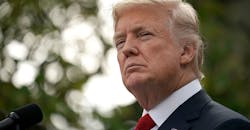Trump Receives Report on US Security Threat of Auto Imports
President Donald Trump has received the findings of a probe into whether imported vehicles pose a national security threat, which could lead the U.S. to impose tariffs.
Commerce Secretary Wilbur Ross has submitted his recommendations to Trump, the department said in a statement on Sunday in Washington, without offering any insights into the findings. Trump has 90 days to decide whether to act on the findings.
Commerce started the investigation in May under Section 232 of the Trade Expansion Act, the same provision the administration used last year to slap tariffs on steel and aluminum. The car probe covers imports of vehicles including SUVs, vans and light trucks, as well as auto parts. American and foreign-based auto manufacturers have been lobbying against it.
Ross had until Sunday to deliver his findings to the president, who has the final say on whether to impose tariffs. Trump has threatened levies of as much as 25% on foreign-made vehicles. Companies and governments from Europe to Asia have warned Trump that tariffs on car imports would hurt the U.S. economy and disrupt the global auto industry.
An auto trade war would deal a blow to carmakers from General Motors Co. to Toyota Motor Corp., which have built their supply chains to take advantage of countries with low duties.
The National Automobile Dealers Association estimates that the tariffs would add as much as $2,270 to the cost of U.S.-built cars and $6,875 to the cost of imported cars and trucks.
“Auto tariffs would be a disaster,” Peter Boockvar, chief investment officer at Bleakley Advisory Group, said last week. “So many parts from so many places that criss-cross countries go into the making of an automobile. Of all the tariffs, this would be the most pervasive."
Trump has 90 days after officially receiving the report to decide whether to act should the department conclude that auto imports are a security threat.
Commerce could recommend a variety of options to restrict imports, including implementing tariffs and quotas. The president then has 15 days to act after announcing he will move forward with measures.
Trump has agreed not to impose auto tariffs on Europe while the two sides work on a trade deal, and Canada and Mexico negotiated side letters to the U.S.-Mexico-Canada Agreement that spares them from new U.S. duties on cars, subject to a cap.
By Andrew Mayeda and Jenny Leonard
About the Author
Bloomberg
Licensed content from Bloomberg, copyright 2016.
